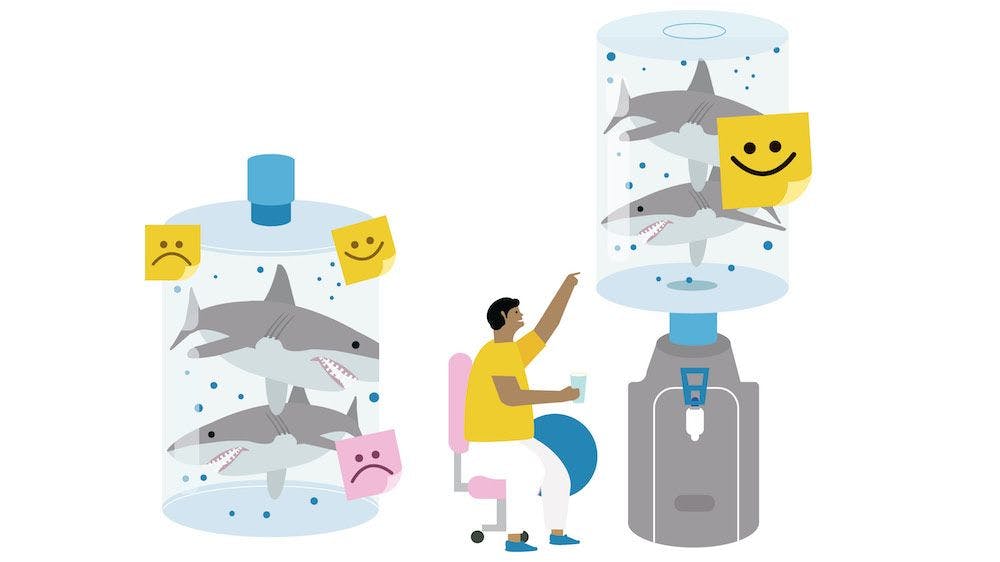
The phrase ‘constructive criticism’ might make your skin crawl, but learning how to deal with feedback could be one of the best things you can do for your career, and your wellbeing
When you’ve put a lot of effort and work into something, it can feel a little disheartening to hear that you’ve missed the mark. Our confidence can be dented when we hear the phrase ‘constructive criticism’, as the listener often seems to omit the word ‘constructive’.
So what is there to do? Well, with a little practise and a change in perspective, you can find the value in accepting constructive criticism.
1. Understand your triggers
In order to help you receive feedback more positively, you must first understand why you might respond defensively. Ask yourself: “How am I interpreting this criticism?”
If the criticism makes you aware of a habit that means you struggle with a task rather than ask for help or clarification, try to dig down to discover what the underlying belief is. For example, “They may think I should know the answer and they will think I’m stupid.” Then go even deeper. Let’s say the root is, “I don’t want to be seen as incompetent,” which can be accompanied by feelings of shame.

Your reaction may stem from a childhood experience, but you aren’t that child any more, and this is a moment when you can learn and grow.
2. Try to remain open
We will all receive criticism at some point, and so the best way to benefit from this is to consider our response, perhaps even rehearse it ahead of time. Use the mantra: “If someone gives me constructive criticism, I’m going to be interested.”
Instead of focusing on the negative self-talk, it can be useful to tell your inner critic: “I’m going to learn something here.” Remind yourself that this is an opportunity to develop – and over time this will feel more natural. Communicating in this manner shows you in a good light. Someone interested in growing, not crumbling, at the first signs of criticism commands respect.
3. Use some of the principles of non-violent communication (NVC)
I use this a lot during couples coaching, and for people who need to be more assertive. It’s about really listening, not just with your ears, but with your eyes, heart, and body – and being genuinely interested in what is being said.
"When someone says that you have made a mistake, that doesn’t mean that you are a mistake"
It’s extraordinary; people really feel heard when you listen. They know you care enough to listen and are invested in their advice. From that peaceful place within you, you can pause. You are in a position to respond. Equally, you can say, “May I think about this and respond later?” That’s absolutely valid too.
4. Try to harness some gratitude
If you can view this situation as an opportunity for your growth, you can try to be grateful that someone has taken the time to share their advice and feedback. But if you take it in a self-damaging way, then you will be the one who suffers.

Perhaps the feedback picks up on a ‘flaw’ or a habit you have. Be honest and ask yourself, “Is this something I have a tendency to do?” For example, do you often rush into something without first gathering all the details, or find yourself struggling with a task, afraid to ask for clarification or help? Sometimes it takes an outside perspective to highlight a habit that might be holding us back. Once we’re aware of this, we can apply self-compassion – and that is certainly something to be grateful for.
5. Remember, everyone on the planet has three things in common
We are human, we are fallible, and we are unique. It’s OK to make mistakes and learn from them, or to share your perspective if you have an alternative viewpoint.
Ultimately, if you struggle with accepting constructive criticism, it might mean working on your self-worth more broadly. When someone says that you have made a mistake, that doesn’t mean that you are a mistake.
Remember that you are human, and you are doing the best you can. If that’s your intention for everything, then you are doing a great job.
To connect with a counsellor who can help you imprive your self-confidence, visit counselling-directory.org.uk

